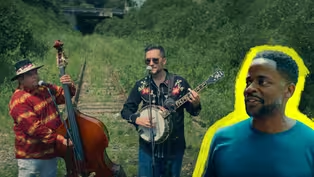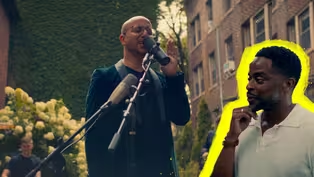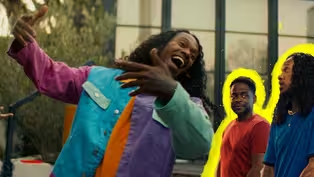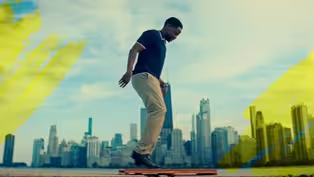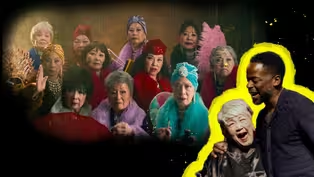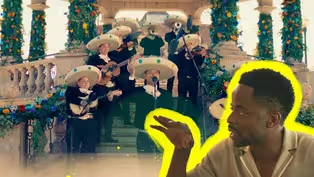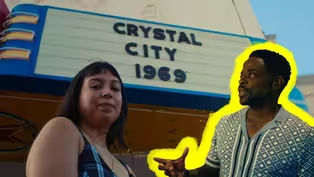
Finding Identity as a Black Appalachian Artist
Special | 14m 51sVideo has Closed Captions
Dulé Hill explores how music can provide solace and healing with musician Amythyst Kiah.
Dulé Hill meets the Grammy-nominated, Appalachian musician, Amythyst Kiah. Amythyst discusses the Black community’s contributions to American traditional music, and how she processed her grief over her mother’s suicide.
Problems playing video? | Closed Captioning Feedback
Problems playing video? | Closed Captioning Feedback
This program was made possible by a grant from Anne Ray Foundation.

Finding Identity as a Black Appalachian Artist
Special | 14m 51sVideo has Closed Captions
Dulé Hill meets the Grammy-nominated, Appalachian musician, Amythyst Kiah. Amythyst discusses the Black community’s contributions to American traditional music, and how she processed her grief over her mother’s suicide.
Problems playing video? | Closed Captioning Feedback
How to Watch The Express Way with Dulé Hill
The Express Way with Dulé Hill is available to stream on pbs.org and the free PBS App, available on iPhone, Apple TV, Android TV, Android smartphones, Amazon Fire TV, Amazon Fire Tablet, Roku, Samsung Smart TV, and Vizio.
Buy Now
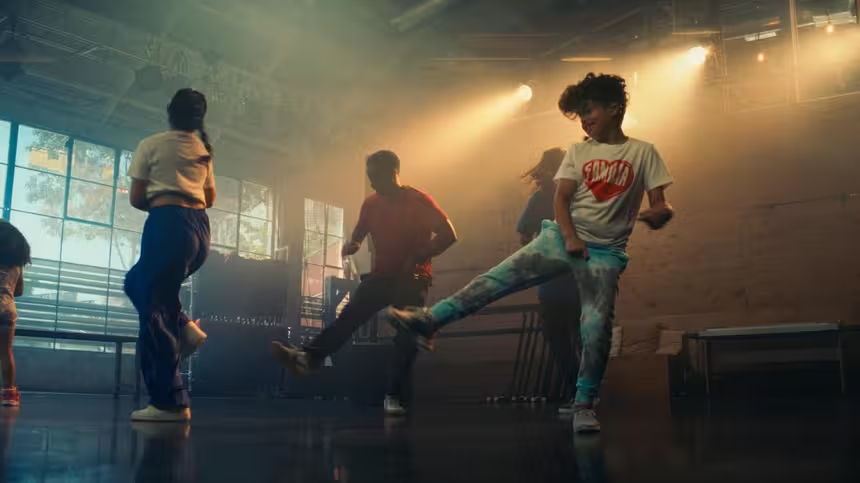
5 Artists Showcasing the Power of Art
From colorful cabarets and moving movies to artistic techniques that transcend the senses, here are five inspiring artists highlighted in The Express Way with Dulé Hill.Providing Support for PBS.org
Learn Moreabout PBS online sponsorshipMore from This Collection
This digital series follows Dulé Hill as he connects with diverse artists across America, exploring their history and letting us into their world on a deeper level.
Blending Latin Folk and Bluegrass Music
Video has Closed Captions
Larry & Joe are blending Latin folk and bluegrass music to show music has no borders. (16m 59s)
Fighting for Syrian Refugees with Soul Music
Video has Closed Captions
A Syrian-American musician brings awareness to the civil war in his family’s homeland. (11m 32s)
Video has Closed Captions
Deaf dancer Shaheem Sanchez changes how Dulé Hill thinks about dance. (11m 42s)
Dulé Hill’s History of Tap Dance
Video has Closed Captions
Dulé Hill shares his motivation for mastering tap dance and carrying its legacy forward. (7m 45s)
Revitalizing Nightlife in San Francisco’s Chinatown
Video has Closed Captions
A multi-generational effort to preserve San Francisco Chinatown’s rich cultural history. (10m 3s)
Reimagining the Mariachi Charro Suit
Video has Closed Captions
Mariachi Arcoiris de Los Angeles reimagines the mariachi charro suit. (8m 36s)
Fighting for the Right to Speak Spanish
Video has Closed Captions
A new play tells the story of a Latino student walkout that changed history in Texas. (8m 13s)
Providing Support for PBS.org
Learn Moreabout PBS online sponsorshipDulé Hill: The rhythm and music of Appalachia for centuries has allowed people to connect and build community.
Even as the sounds of the mountain continued to evolve with each new generation of diverse artists, music always has the capacity to provide solace and healing in our darkest hours.
♪ Hill: Art is powerful.
[Cheering and applause] Man: It's our honor to have an incredible singer-songwriter with us.
She got one of the most powerful voices that we've heard, so please put your hands together for Amythyst Kiah.
[Cheering and applause] [Acoustic guitar playing "Black Myself"] ♪ Hill: When you think about the origins of bluegrass and country music, you might think of white artists like Bill Monroe or the Carter Family, but that's only part of the story.
Amythyst Kiah is building upon the rich legacy of Black artists playing traditional music in Appalachia, and her song "Black Myself" has earned her a Grammy nomination.
Kiah: ♪ I don't creep around, I stand proud and free ♪ ♪ 'Cause I'm Black myself ♪ ♪ I go anywhere that I wanna go ♪ ♪ 'Cause I'm Black myself ♪ Hill: When I first heard Amythyst's voice, I was completely blown away.
You don't have that kind of soul, that kind of passion, that kind of power without going through some pain.
Kiah: ♪ Black myself ♪ [Cheering and applause] ♪ [Cheering and applause continue] Thank you all so much.
[Train horn blows] [Knocks on door] Man: Hello, Dulé.
How are you?
Hill: Hello, sir.
How you doing?
Amythyst: Hey.
Man: Pretty good.
Hill: Dulé Hill.
Very nice to meet you.
Man: Yeah, good seeing you.
Amythyst: Hey.
Amythyst Kiah.
Yeah.
Hill: Amythyst, oh, very nice to meet you.
It's a pleasure.
It's a pleasure.
I love you got, like, all of these stringed instruments.
Kiah: Yeah.
Hill: I see a banjo.
Kiah: Yes.
Is it in tune?
That's the question.
♪ Kiah, voice-over: The banjo, its origins are from West Africa, so West African banjo music and Scots-Irish fiddling came together here in this region and became early country music.
Jerry Reed: Do it, boys.
Hill: When you first were getting into bluegrass and old-time music, what was the reception like?
Kiah: They would ask me questions that you could interpret as microaggressions-- such as, "Well, how did you get into bluegrass music?"
-- because of my skin color, like, "How did you get into this?"
♪ Reed: Yeah.
Kiah: It was always confusing to me when people would align their--whether they were black or white to what they listened to.
I think what really important lesson I learned from my parents was that you don't have to let your skin color define what you enjoy listening to.
The more that I got into roots music and how important it was to Appalachia and Appalachians' identity, it helped me see, like, where I fit in in all of this.
Man: She wanted to play piano.
We didn't have room for a piano, so we had a talk about making some adjustments in the type of instrument that she wanted to play, so her next instrument was the guitar, so we went and bought a used guitar.
Kiah: Of all the gifts that my parents have ever given me, I had no idea how much it was gonna change my life in such a radical way.
♪ I was a tomboy.
My parents never tried to push me in any direction of whether I needed to play with Barbie dolls or whether I needed to ride a bike or whatever.
They just let me be a kid, and whatever I enjoyed, they just allowed me to enjoy it.
And then, once I turned 13, you know, eighth grade, going into high school, things started to get kind of confusing for me because I saw this pattern of, like, girls seem to be doing this and guys seem to be doing this, and what I was doing seemed to be more like what guys were doing, but I didn't quite fit in with them.
♪ The way that I processed feeling alone was through playing music, especially when my parents' marriage started to break down.
I knew that things weren't great because my dad was battling a drug addiction.
Sometimes at night, I could hear them arguing.
I could hear her crying, asking him to stop and him just being out of it.
Phillips: The marriage had its rough spot during that period.
It was just gut-wrenching.
Kiah: She was trying to, like, keep up with payments on the house.
She was also going through menopause at the time, so, looking back now, it's--I could see where you could have a moment of despair.
[Playing "Wild Turkey"] ♪ ♪ Late at night when I feel alone ♪ ♪ I cry in darkness, screaming to the unknown ♪ ♪ 'Cause she's never coming back ♪ ♪ No, she's never coming back ♪ ♪ Body and water for days and days ♪ ♪ Hopes for a safe return, my hope's in vain ♪ ♪ 'Cause she's never coming back ♪ ♪ No, she's never coming back... ♪ Phillips: The moment I found out she was a budding singer-songwriter was when her mother died.
She said she was going to work, and I called work.
She hadn't showed up, and she left a note in my truck.
Kiah: ♪ Tried so hard to be an automaton ♪ ♪ Body of steel and wired circuits for my backbone ♪ ♪ 'Cause she's never coming back ♪ ♪ No, she's never coming back ♪ ♪ Wild Turkey in the car seat ♪ ♪ The bottle's empty ♪ ♪ I hope it gave her some relief ♪ ♪ 'Cause she's never coming back... ♪ When they found the car at the Tennessee River with the bottle of Wild Turkey empty, the detective asked my dad, "Did your wife drink?"
We honestly have no idea what all she was doing to cope with things.
♪ Stayed numb for years to escape despair ♪ ♪ When your soul dies ♪ ♪ You just can't hide it ♪ ♪ Everyone can tell ♪ ♪ Oh, Lord, will I ever feel?
♪ ♪ Phillips: She walked off in the river... ♪ and that's the last day I saw her.
Kiah: With depression, it's crazy how distorted your thinking becomes.
If you could hang in there for a couple more days or, like, maybe go talk to somebody, then maybe you'd feel differently.
♪ ♪ When I was 17 ♪ ♪ I pretended not to care... ♪ Phillips: At the funeral, she got up.
She wrote a song, and she sang the song at her mother's funeral.
Kiah: ♪ When your soul dies ♪ ♪ You just can't hide it ♪ ♪ Everyone can tell ♪ ♪ Oh, Lord, will I ever feel ♪ ♪ Will I ever feel ♪ ♪ Right again?
♪ ♪ ♪ Hill: You cannot hear Amythyst's music and not be touched, not feel the power, not feel the pain.
I just couldn't imagine being 17 years old and having to reconcile with myself, with the reality that my mother left me.
Kiah: ♪ Dig a hole ♪ ♪ In the meadow ♪ ♪ Dig a hole in the cold, cold ground ♪ Kiah, voice-over: I really just repressed my grief and just tried to ignore it, and eventually, it led to alcohol.
♪ There's a reason why they call alcohol liquid courage.
It gives you the illusion that now everything's fine.
♪ I started to go out on the weekends, and then it turned into, you know, Monday and then Tuesday and Wednesday, and alcohol was the way to, like, not be anxious.
Phillips: I noticed that every time she got upset about something, she wanted to have a drink, and I knew then straight up.
I said, "This is not right."
Kiah: At that point, it was, like, self-sabotage.
All these things that I were doing was directly affecting my mental and physical health.
Phillips: She was so withdrawn that when she performed, she would look down, and she just played.
She couldn't look at the audience.
Kiah: Music no longer was my stress reliever.
Alcohol became the stress reliever.
♪ My dad, he saw the pattern that was gonna destroy my entire life.
Phillips: It took more than one talk... Kiah: Of course.
Ha ha ha!
Yeah.
Phillips: but at the same time, I was persistent, and she listened.
♪ Kiah: So I talked to a therapist, and I finally unpacked that the reason why I was doing all of this is because I had never really dealt with the grief of my mom.
Man: I can't wait to hear our opening act, Amythyst Kiah.
[Cheering and applause] Kiah: I've been able to reframe how I use alcohol now.
If I'm upset, I don't run for a drink.
I pick up my guitar, and I've learned to love music again for the original reason that I loved it-- the ability to be able to express my ideas and thoughts.
This song is a new one that I wrote earlier this year with a wonderful singer-songwriter named Sean McConnell.
This kind of feels like my theme song 'cause it's, uh, paying homage to...Appalachian Mountains, East Tennessee, where I'm from.
It's about me finding my way but with the mountains guiding me, I guess.
[Cheering and applause] It's called "Empire of Love."
[Playing "Empire of Love"] ♪ ♪ Concrete pillars ♪ ♪ Golden dawn ♪ ♪ There are kingdoms come and gone ♪ ♪ And we're living on ♪ Hill: I was aware of Amythyst's music before I met her, her being a dynamic talent, but I didn't realize the depths that it went, the pain and the trauma that she has come through, and it's an encouraging thing 'cause no matter what you're going through, no matter where you've come from, there's no place that's too dark, no place that's too challenging.
Kiah: ♪ Well, I don't want ♪ ♪ A theocracy ♪ ♪ Or some idle ideology ♪ ♪ We're all made from stars from above ♪ ♪ I pledge allegiance to my soul ♪ ♪ I follow where she needs to go ♪ ♪ I'm a pilgrim for the empire of love ♪ ♪ I'm a pilgrim for the empire of love ♪ ♪ I'm a pilgrim for the empire of love ♪ ♪ Ah ♪ [Cheering and applause] Kiah: Love you all.
Thank you so much.
We'll see you down the road.
Come by and say hi.
Thank you.
Hill: Thanks for watching.
For more of "The Express Way" with me, Dulé Hill, you can tune in to the full-length series on the PBS app or your local PBS station.
Check out the link in the description to watch a full episode and find out more about the show.
Support for PBS provided by:
This program was made possible by a grant from Anne Ray Foundation.
